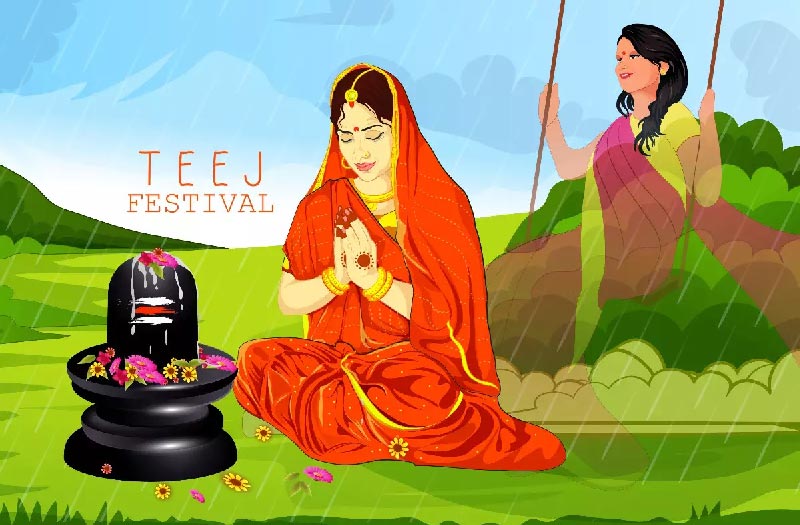
Haritalika Teej Festival:
Hindu women are celebrating the Haritalika Teej festival on the day of Bhadra Shukla Tritiya by worshiping Devadi Dev Mahadev. There is a religious belief that if one fast and worships Shiva Parvati these days, one will attain happiness, peace, and welfare.
Married women wish for the longevity of their husbands and unmarried women wish for a worthy bridegroom. Classically, both men and women have to fast on the green table, but the social discussion is that women do it to wish their husbands longevity.
Legend and classical beliefs :
There is a religious belief that if one fast on Bhadra Shukla Tritiya and worships Shiva Parvati, one will attain happiness, peace, and welfare. In the Satyayuga, the Himalayan daughter Parvati was blessed with a husband by living in Gaurighat and doing penance, but when the Himalayan father tried to marry Vishnu against Parvati's wishes, she told her friends about her problem.
When Parvati found out that she was in trouble, her friends abducted her and hid her in a place where no one could see her. In the place where her friends hid, Parvati fasted and got Mahadev. Since the day when Parvati was abducted by her friend is Bhadra Shukla Tritiya, there is a theological opinion that the practice of fasting for green tea has started from that time.
The Sanskrit words 'Harit' and 'Alika' are combined to form the word Haritalika. In which the word 'green' means deprived and the word 'alika' means friend. It is believed that Parvati, who fasted on this day in the Satyayuga, got Shri Mahadev Swami.
Hartalika Teej Fasting rules:
"There are three types of fasting: fasting, eating, and eating fruit. It is better to fast for those who can't fast and for those who can't eat," he said. It is better to fast by considering the scriptural phrase "Sarvatah Atmanam Gopayet", which means to protect the soul from all sides and fast only.
He also informed that those who are not in good health can fast by eating fruits like wheat bread, cornbread, apples, oranges, and bananas. Dr. Devmani Bhattarai, head of the theology department at Valmiki Vidyapeeth, said that false propaganda was being spread that Teej would fast only wish her husband long life.
"There is a classical law that unmarried girls and boys should fast for the sake of good fortune, for having children, for the sake of getting a good bride and groom," he said. Since women represent the family as guardians of the fast, men also fast when they are unable to do so or during menstruation. In this sense, the theologians say that the discriminatory fasting tradition raised by some feminists is not as strong as it is now.
Glory:
Theologians are of the opinion that the purpose of fasting is to fulfill one's desires and for the welfare of the whole family. Both spiritualists and theists have observed this fast. In this world as a whole, fasting is important for happiness, peace, and transcendental bliss.
It is believed that Teej's Brat fulfills the desire for peace in the family and prolongs the life of the husband. It is believed that even the unmarried can get the gift they want by staying in today's brat.
There are five types of fasting: Sakam, Nishkam, Nitya, Naimittik, and Kamya. There is a scriptural belief that the fasting of Teej is both daily and lustful. He also said that the fasting of Teej is not only for Hindus but also for human beings.
Committee Chairman Gautam also said that this vow should not be taken in a narrow sense as it is mentioned in the scriptures as 'Akarane Pratyavaya Shravanat Karne Phal Shravanachch Haritalika Vratam Nityam Kamyam Cha Bhavati'. Which means that if you do not fast, you will feel guilty, if you do, you will get the fruit. This fast is both daily and occasional.
It became common for men to work outside the home and for women to do housework. It is understood that women are also given the responsibility of fasting when they start doing religious work including housework. Women often perform religious duties at home.





